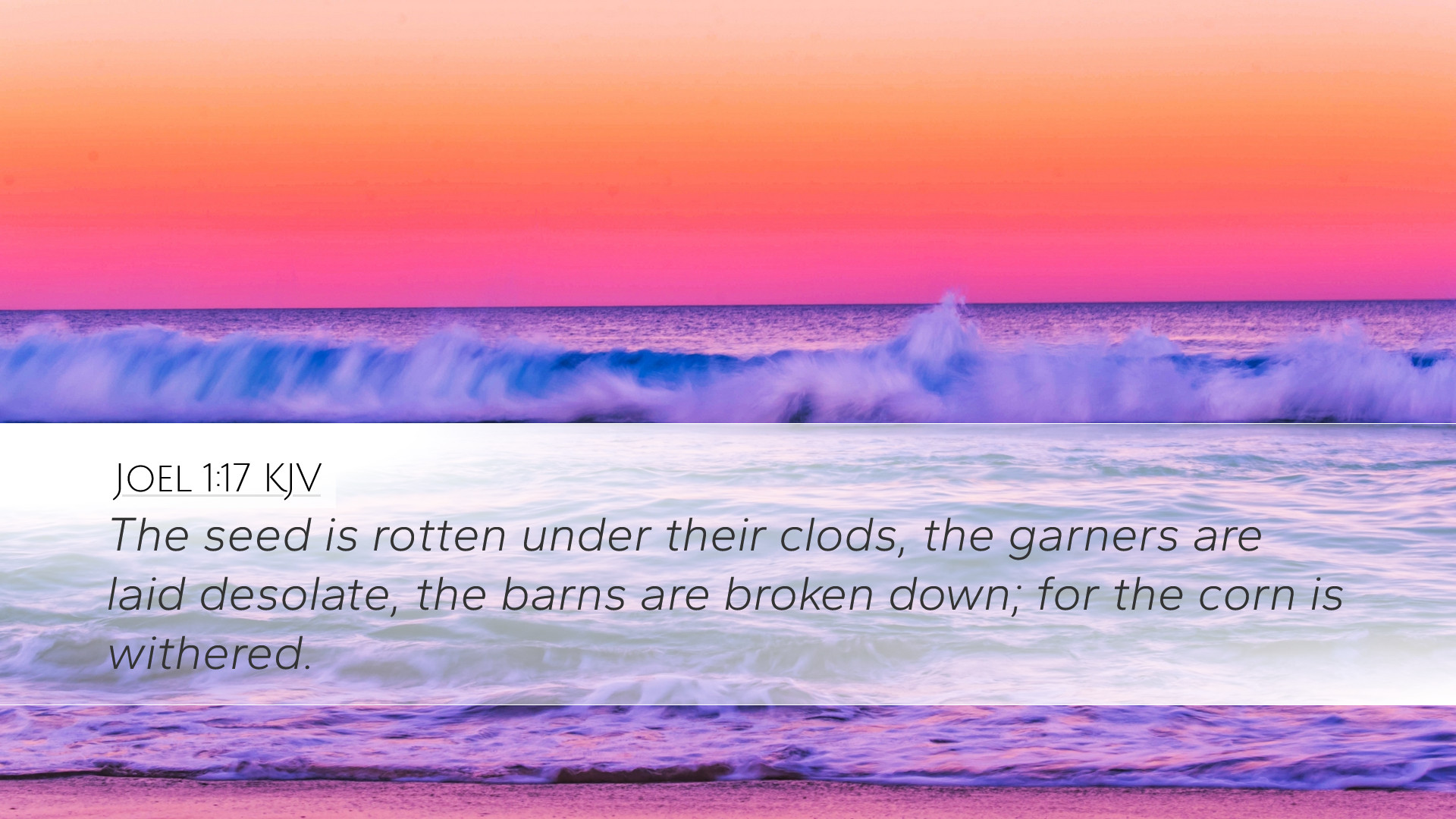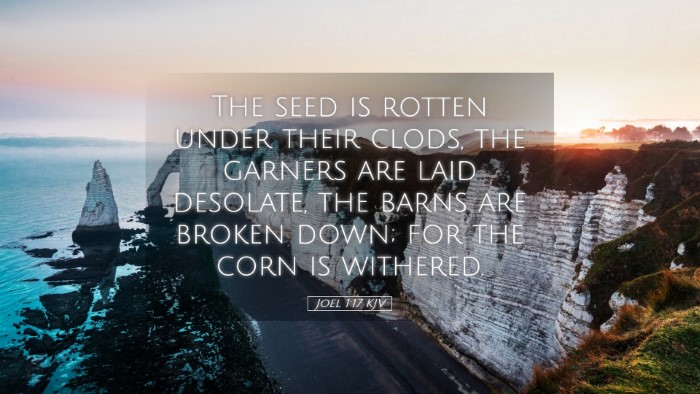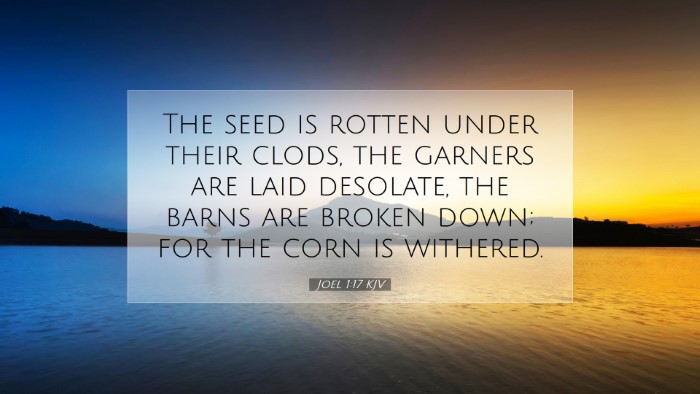Old Testament
Genesis Exodus Leviticus Numbers Deuteronomy Joshua Judges Ruth 1 Samuel 2 Samuel 1 Kings 2 Kings 1 Chronicles 2 Chronicles Ezra Nehemiah Esther Job Psalms Proverbs Ecclesiastes Song of Solomon Isaiah Jeremiah Lamentations Ezekiel Daniel Hosea Joel Amos Obadiah Jonah Micah Nahum Habakkuk Zephaniah Haggai Zechariah MalachiJoel 1:17
Joel 1:17 KJV
The seed is rotten under their clods, the garners are laid desolate, the barns are broken down; for the corn is withered.
Joel 1:17 Bible Commentary
Commentary on Joel 1:17
Verse: "The seeds are rotten under their clods, the garners are laid desolate, the barns are broken down; for the corn is withered."
Introduction
Joel 1:17 serves as a poignant illustration of the devastation wrought by locusts and other calamities upon the land of Judah. This verse encapsulates the dire condition of the agricultural ecosystem, symbolizing not just physical decay but also spiritual desolation that resonates deeply with a multitude of theological themes. The commentaries from Matthew Henry, Albert Barnes, and Adam Clarke provide a richly woven understanding of the socio-political, spiritual, and prophetic implications embedded in this scripture.
Expository Breakdown
Contextual Setting
The book of Joel is characterized by its urgent call to repentance during a time of great crisis. The locust plague described in the early chapters is a central event that triggers the prophet's lament and prophetic pronouncements. Joel leverages this national catastrophe to awaken the people to a greater spiritual reality; hence, Joel 1:17 symbolizes not just the physical loss but also the spiritual barrenness that can accompany such devastating events.
Analysis and Commentary
-
Matthew Henry:
Matthew Henry emphasizes the gravity of the agricultural devastation described in this verse. He notes that the "seeds being rotten under their clods" indicates a profound failure of the earth to yield its produce, symbolizing God's displeasure with His people. This imagery is used to convey the concept that when sin prevails, even the land itself suffers. The desolation of the grain stores—the "garners"—is indicative of a broader malaise, representing the national anguish that results from divine judgment.
-
Albert Barnes:
Barnes highlights the connection between natural calamity and divine retribution. He interprets the "barns being broken down" as a direct response to the people's ingratitude and failure to heed God’s will. The emphasis on "corn withering" serves as a stark reminder of the consequences of turning away from God. Barnes points out that this divine reprimand is not merely about physical loss but also an invitation to repentance and acknowledgment of their dependence on divine provision.
-
Adam Clarke:
Adam Clarke draws attention to the vivid agricultural imagery, stressing that the condition of the seeds reflects the spiritual state of the nation. He discusses how the agricultural failure serves as a metaphor for the people’s failure to cultivate their relationship with God. Clarke asserts that the physical barrenness of the land echoes a spiritual barrenness, imploring the faithful to understand that material prosperity flows from spiritual fidelity to God.
Theological Implications
The implications of Joel 1:17 extend deeply into theological realms, addressing themes of judgment, repentance, and restoration.
- Judgment: The imagery presented in this verse serves as a sobering reminder of the repercussions of national sin. The locust plague can be viewed as a divine judgment, where the consequences are visible not only in the agricultural sector but as a broader reflection of the nation’s heart.
- Repentance: Recognizing that such calamities signal the need for repentance is a recurrent theme in Joel. The lamentation over the land calls the people to turn back to God; thus, the physical state becomes a catalyst for spiritual awakening.
- Restoration: While the verse is one of lament, within the context of the entire book, it also lays the groundwork for hope. Following the judgment, there is the promise of restoration for those who return to the Lord, a theme that is foundational for understanding God’s merciful character.
Practical Reflections
For pastors, theologians, and students, Joel 1:17 presents an array of practical applications:
- Awareness of Divine Providence: The natural order is a reflection of God's sovereign rule. Believers are called to recognize that blessings and hardships alike come from the hand of God, urging a posture of dependence and gratitude.
- Call to Collective Responsibility: Just as the agricultural crisis affected the community, modern believers are reminded of their collective responsibility in spiritual matters. The actions of individuals can have repercussions for the community at large.
- Encouragement to Seek Restoration: There is an inherent hope that lies within the call to repentance. Leaders and congregants alike are encouraged to seek restoration not only for the land or their circumstances but for their relationship with God.
Conclusion
In summary, Joel 1:17 serves as a vivid illustration of devastation that transcends mere agricultural loss, inviting deeper contemplation into the nature of judgment, the call to repentance, and the assurance of restoration. Through the insights from public domain commentaries, one gains a multifaceted understanding that speaks across generations, urging a reflective and responsive heart towards God's ongoing work in our lives and communities.


